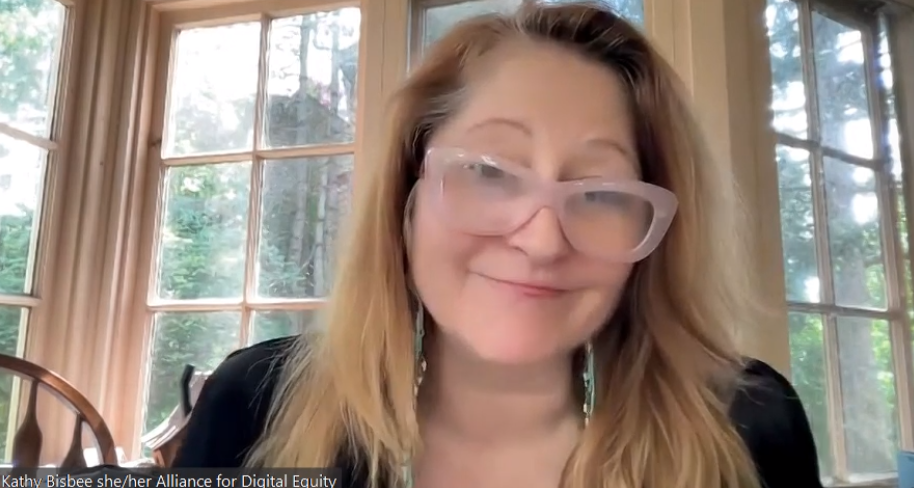
digital equity
Experts say a shift toward community-informed digital navigation can build equitable connectivity

 Screenshot of Kathy Bisbee, director of the Alliance for Digital Equity, speaking during the Next Century Cities webcast
Screenshot of Kathy Bisbee, director of the Alliance for Digital Equity, speaking during the Next Century Cities webcast
WASHINGTON, May 30, 2024 – Digital equity experts gathered Thursday on a Next Century Cities webcast to discuss their plans to continue bridging the digital divide after funding for the Affordable Connectivity Program expires tomorrow. They emphasized a community collaboration approach.
First launched in 2021, the ACP provided a $30 discount on internet bills to 23 million low-income households. However, the program did not receive new funding from Congress, which originally provided $14.3 billion for the subsidy fund.
Kathy Bisbee, director of the Alliance for Digital Equity, said the challenges brought about by the end of ACP have been an opportunity for digital equity providers to plot new strategies, which included relying on partnerships and community collaboration.
“We have had to work really closely in partnership to think about how we were going to re-scope,” Bisbee said, “[We had] to think about new opportunities, reach out to partners maybe we hadn’t even thought to reach out to yet.”
Bisbee’s Massachusetts-based organization has shifted toward offering digital navigation curricula, collaborating with relevant underserved communities to ensure they best meet local needs. These tailored digital navigation programs provide community members with the ability to navigate critical online services.
However, despite her optimism for outreach programs, Bisbee said there is still work to be done to create a sustainable solution for providing affordable internet in underserved areas.
“We know that we need lots of digital navigators… and we need affordable internet, and without ACP we’re going to have to come up with some of those solutions locally,” Bisbee said.
Gabrielle Daley, a broadband expert at the University of Colorado Law School, also highlighted the importance of local solutions going forward.
Daley cautioned about a potential “trust gap” forming between communities and affordability programs caused by the end of ACP.
FCC Commissioner Anna Gomez has made the same point.
“A loss of [ACP] funding will mean a loss of trust in this public-private partnership that could squander this opportunity to close the digital divide,” Gomez said in a Jan. 11, 2024 statement.
Daley recommended building upon existing local programs where possible to maintain community trust.
“I think there’s an opportunity there to ameliorate the situation and really embed an institutionalized broadband affordability,” Daley said.
Daley also emphasized the importance of the industry not becoming disheartened and “bogged down” by the end of the ACP. She said industry needed to focus its attention on exploring new opportunities.
“When I think about ACP going away, what I try and do is remind myself of the overall goal,” Daley said. “We need to identify adequate and stable funding for broadband support programs, and we have a lot of different ways we can go about doing that.”
Corian Zacher, senior policy counsel at Next Century Cities, highlighted a possible silver lining emerging from the situation, pointing to future legislation that is an improvement on the original ACP law.
“The Affordable Connectivity Program was not perfect. If there’s a new iteration of the program, that also means there are opportunities for change, so I’m so excited about that,” Zacher said.

